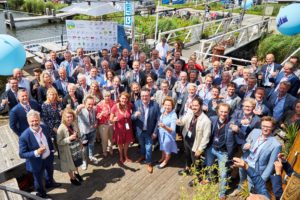Er leiden meer wegen naar slimme en schone stadslogistiek
Historische kades zakken in, de eerste fijnstofvluchtelingen hebben zich gemeld en in smalle straten staan files met vervuilende bestelbusjes en vrachtwagens; we moeten in de Metropoolregio Amsterdam nu echt aan de slag met slimme en schone stadslogistiek.
Op initiatief van de Amsterdam Economic Board tekenden afgelopen voorjaar meer dan 50 partijen uit de metropoolregio Amsterdam de Green Deal Zero Emissie Stadslogistiek (GDZES). Een signaal dat zowel bedrijven als gemeenten, provincies en onderzoeksinstellingen in de regio nu echt stappen willen zetten naar slimme en schone stadslogistiek.
Waarom slimme en schone stadslogistiek?
Dagelijks rijden, vaak halfvolle, vervuilende vrachtwagens en bestelbusjes door en naar onze steden in de regio: bevoorrading van de horeca, supermarkten, de bouwplaatsen, afvalinzameling, post en pakketjes, catering en bevoorrading van kantoren, etc. Dit leidt niet alleen tot ongewenste CO2-uitstoot en luchtvervuiling, maar ook tot grote druk op openbare ruimte in de (historische) stadscentra en wijken. Om de CO2-doelstellingen van 2050 te halen zal het goederenvervoer ten opzichte van 1990 een factor zes aan CO2-productiviteit moet winnen in 2050. De CO2-uitstoot van het goederenvervoer zit overigens voor één derde in de internationale grote stromen naar het Europese achterland, voor één derde in nationaal transport en één derde zit in de bevoorrading van steden: de stadslogistiek dus!
Hoe kunnen we de stadslogistiek in de MRA schoner en slimmer maken?
Zoals hierboven beschreven kent stadslogistiek vele segmenten. Elk met hun eigen specifieke te vervoeren producten en logistieke stromen. Om tot slimme en schone stadslogistiek te komen zullen regionale overheden, het bedrijfsleven (zowel de transportsector zelf als de bedrijven die dagelijks bevoorraad willen worden) en onderzoeksinstellingen (er valt nog veel te onderzoeken binnen de stadslogistiek) de handen ineen moeten slaan!
Met de ondertekening van de Green Deal Zero Emission Stadslogistiek op 19 juni jl. is die samenwerking beklonken. Nu komt het erop aan dat ieder zijn/haar verantwoordelijkheid neemt en zich in gezamenlijkheid gaat inspannen: gemeenten, provincies, vervoerders, verladers, onderzoeksinstellingen, bedrijven en instellingen, voertuigproducenten, het MKB, etc.

ondertekening greendeal ZES – 19 juni 2019
Wat kunnen partijen in de MRA concreet doen?
Het bedrijfsleven is op verschillende manieren aan zet. Voertuigproducenten zullen versneld met nieuwe schone voertuigen op de markt (gaan) komen. De vervoerders zullen moeten gaan investeren in de aanschaf van die schone voertuigen. Dat lukt de grote vervoerders overigens sneller dan de MKB-bedrijven en zogenaamde ‘eigen vervoerders’ , die toch ook mee zullen moeten gaan bewegen. Bedrijven (van ‘corporates’ tot lokale restaurants) en instellingen (van ziekenhuizen tot onderwijsinstellingen) kunnen inkoopeisen gaan stellen aan hun leveranciers om voortaan vol beladen én zero-emissie beleverd te willen worden. Dat kan individueel, maar ook gezamenlijk binnen een gebied.
We weten nog lang niet genoeg over alle segmenten binnen stadslogistiek: de dagelijkse stromen en bewegingen, de herkomst en bestemmingen van de verschillende goederen, de beladingsgraad van voertuigen, het bestelgedrag van consumenten, effecten van beleidsmaatregelen, de mate van uitstoot van (onderdelen van) stadslogistiek, etc. Landelijke kennisinstellingen zoals TNO en KIM, maar ook regionale partijen als de HvA, UvA, VU en AMS hebben een cruciale rol om dit te onderzoeken, de resultaten te duiden en deze met overheden en bedrijfsleven te delen.
De MRA-gemeenten en provincies zijn aan zet om (regionaal) afspraken te maken over beleid rond:
- het instellen van (in het Klimaatakkoord aangekondigde) zero-emissie zones in 2025
- beschikbaarheid van elektrische laadpunten in combinatie met de toenemende lokale energievraag
- ontwikkeling van regionale ‘logistieke hubs’ aan randen van steden
- stimuleren van waterstof als zero emissie brandstof op (middel)lange termijn
- vergunning-eisen voor schone bouwlogistiek
- instellen van venstertijden voor bevoorrading
- stimulerend ‘privilegebeleid’ voor schone vervoerders
- (regionale) subsidiering aanschaf zero-emissie bestelwagens
- vergroening van het eigen voertuigenpark
Bekijk hier de video die we voor gemeenten maakten; met 7 tips om snel aan de slag te gaan met slimme en schone stadslogistiek.
De rol van de Amsterdam Economic Board
Een handtekening zetten is één, nu is het tijd om samen in actie te komen. Daarom organiseert de Board in vervolg op de ondertekening een serie Meetups rondom de Green Deal Zero Emissie Stadslogistiek. Doel van deze GDZES Meetups is om elkaar als regionale overheden, bedrijfsleven en kennisinstellingen te inspireren, ideeën, kennis en ervaringen te delen, nieuwe initiatieven onder de aandacht brengen en –last but not least – nieuwe mensen en partijen te ontmoeten waar je samen mee op kan trekken om de stadslogistiek slim en schoon te maken.
Contact
Wil je meer informatie, of een bijdrage leveren aan de Green Deal ZES MRA? Neem een kijkje op deze webpagina of neem contact op met onze Challenge Lead Mobiliteit, Richard Hoving
30 november 2019
Meer weten over
Neem contact op
Blijf jij ook op de hoogte?
8x per jaar nieuws en events uit de regio: schrijf je in voor de Board Update nieuwsbrief
Deel dit artikel
Wil je op de hoogte blijven?
Volg ons dagelijks op LinkedIn en schrijf je in voor de Board Update nieuwsbrief.
Lees ook deze berichten
- Een nieuwe lichting gedreven jongeren is aangetreden bij Young on Board, de ...
- Met de selectie van vier kanshebbers is de regionale voorronde van de ...
- Met meer dan 80 ondernemers, 40 investeerders en diverse dienstverleners bood LSH Capital Match ...

